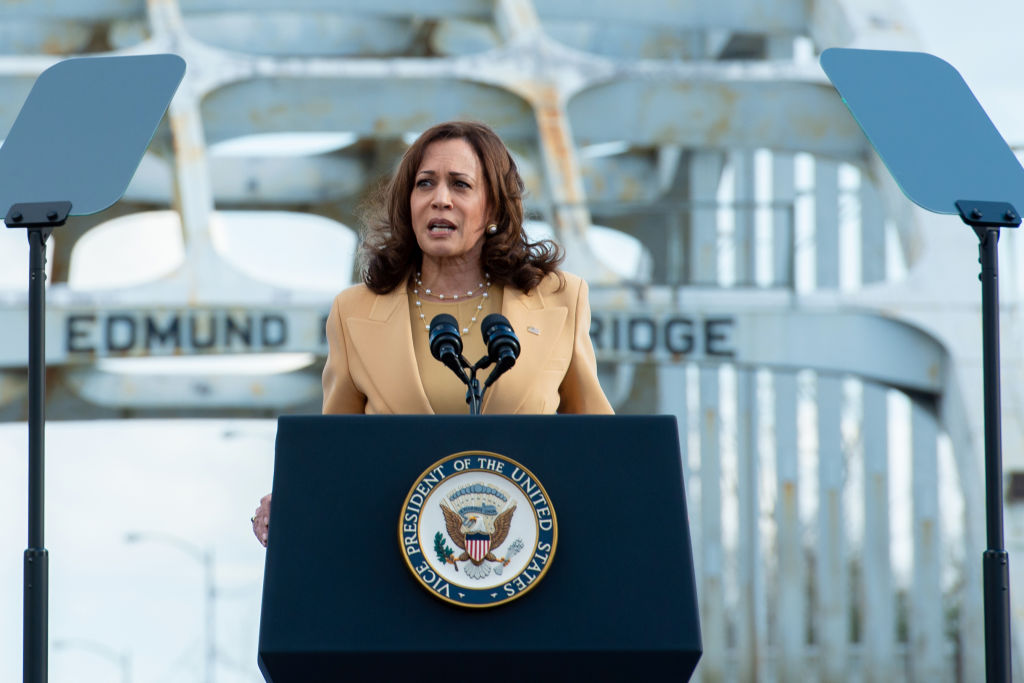
This article is part of the The DC Brief, TIME’s politics newsletter. Sign up here to get stories like this sent to your inbox.
It was a quick invocation, one you probably missed during Vice President Kamala Harris’ visit to Selma yesterday. Standing by the bridge that was the site of a violent clash between civil rights leaders and segregationist police in 1965, the first Black woman to serve as Vice President drew a haunting parallel between the American icons who marched for their rights and the Ukrainians fighting for their country’s survival against an invading Russian military.
“Today, the eyes of the world are on Ukraine and the brave people who are fighting to protect their country and their democracy. And their bravery is a reminder that freedom and democracy can never be taken for granted,” Harris said, taking a pause here. “By any of us.”
The whole intro took less than a minute. But she planted the seed of context for the speech that followed. It then was impossible not to be thinking about Ukraine while listening to a speech on voting rights and civil rights heroes. It was subtle and nuanced, and a reminder that Harris at her best is a formidable political talent.
The resonance of the battles spread across Ukraine and the domestic political fight against laws designed to restrict voting rights is one that requires a deft touch, one that Harris’ background lends her. In politics, there are just some biographies that bring stronger credibility. When Hillary Clinton spoke about women’s rights, she didn’t have a credibility hurdle to overcome. When John McCain came out forcefully and consistently against torturing prisoners, the world listened to the former prisoner of war. When Gabby Giffords and Mark Kelly speak about gun violence, it’s impossible to discount them.
Well, when it comes to the unfinished work on civil rights in this country, Harris enjoys that standing, too. In the balance of the speech, with the iconic Edmund Pettus Bridge just to her left, Harris confronted the incomplete work to protect voting rights in this country. The U.S. Supreme Court in 2013 gutted the law passed months after the original Selma march, arguing that protections for Black voters were no longer needed in states with deep histories of discrimination. In the years since, states have moved methodically to make access to ballots tougher.
Harris’ rhetoric on voting rights was in tandem with the events unfolding in Ukraine. “At this moment, we are faced with a choice, a choice that we have faced many times before: Do we stand or do we fight? Gathered at this bridge, reflecting on its history, yes, I know the path forward is clear,” she said.
And, as in Selma, that fight in Ukraine has galvanized a nation shocked by the images coming from the field. There’s part of our minds that reacts the same way when confronted with such brutality, whether it is a Black activist being beaten by a police officer or a mother marching across a muddy field fleeing assured violence. It’s easy to see the situation is wrong and there is something in the American gut demanding a remedy.
That’s why back in Washington, this week is going to see increasing pressure on the Administration to take more aggressive action. A no-fly zone seems to have support from almost no one other than Joe Manchin at the moment and there are worries that a three-party swap to send Polish warplanes to Ukraine with promises of American replacements to backfill Poland could inflame the situation. Proposals to ban the import of Russian oil seem almost fait accompli by now, and there is a growing understanding that not ending business with Russia is going to cost Wall Street firms their bottom line. Banks, financial institutions, and even Netflix have all cut off Russian customers in an effort to show them that their government’s belligerence against Ukraine is going to cost them.
Still, there remains plenty of worry about just how long Ukraine can hold off Russia. The power dynamic is simply impossible to ignore. At some point, resistance reaches its limits and persistence becomes the test. In Selma, for instance, the marchers were twice turned back before successfully crossing the bridge with the protection of almost 2,000 National Guardsmen. In Ukraine, there is similar resolve among the people, but a lack of partners willing to stand with them on the field.
Harris rang that bell loud and clear for all who listened in Selma. In her own way, she was drawing the comparison between those who marched in Selma and those who fight in Kyiv. To Black voters skeptical of a war, this was an argument for intervention, rooted in the intersectionality of politics. And as Harris heads to Poland and Romania this week for talks, world leaders should watch her remarks in Alabama for a clue about what she’s advising President Joe Biden. Harris understands the stakes, and European leaders should listen to Selma.
Make sense of what matters in Washington. Sign up for the D.C. Brief newsletter.
More Must-Reads from TIME
- Where Trump 2.0 Will Differ From 1.0
- How Elon Musk Became a Kingmaker
- The Power—And Limits—of Peer Support
- The 100 Must-Read Books of 2024
- Column: If Optimism Feels Ridiculous Now, Try Hope
- The Future of Climate Action Is Trade Policy
- FX’s Say Nothing Is the Must-Watch Political Thriller of 2024
- Merle Bombardieri Is Helping People Make the Baby Decision
Write to Philip Elliott at philip.elliott@time.com